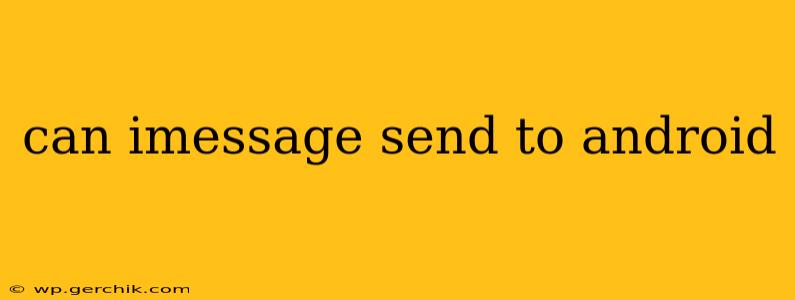Can iMessage Send to Android? Unlocking the Cross-Platform Communication Mystery
The short answer is: no, iMessage doesn't directly send messages to Android phones. This is a common point of frustration for iPhone users with Android-using friends and family. iMessage, Apple's proprietary messaging service, is tightly integrated into the Apple ecosystem and relies on Apple servers for its functionality. Android phones use different messaging protocols.
However, there are workarounds and alternatives to facilitate communication between iOS and Android devices. Let's dive into the details.
Why Doesn't iMessage Work with Android?
This limitation stems from Apple's control over its ecosystem. iMessage uses Apple's servers and infrastructure, incorporating features like read receipts, typing indicators, and high-quality image and video sharing that aren't directly compatible with the protocols used by Android's messaging apps (typically SMS/MMS). Building cross-platform compatibility would require significant engineering effort and potentially compromise some iMessage features.
What Happens When You iMessage an Android User?
When you try to send an iMessage to an Android phone, several things can occur:
- The message might send as a standard SMS/MMS. This typically happens if the recipient's number isn't registered with iMessage. The message will appear as a green text bubble in your iMessage app, indicating it's sent via SMS/MMS and not through Apple's iMessage servers. This method is usually lower quality and lacks the rich features of iMessage.
- The message might fail to send. In some cases, the message simply won't go through if there are connectivity issues or difficulties determining whether the recipient's phone is registered with iMessage.
Can I Use Other Apps to Message Android Users?
Absolutely! There are several cross-platform messaging apps that work seamlessly across iOS and Android, eliminating the iMessage-Android barrier:
- WhatsApp: A hugely popular, free messaging app owned by Meta that supports end-to-end encryption.
- Facebook Messenger: Another widely used platform, especially among Facebook users.
- Signal: A privacy-focused messaging app known for its strong encryption.
- Telegram: Offers a wide array of features and supports large group chats.
These apps use their own servers and protocols, allowing for consistent communication regardless of the operating system.
How Can I Ensure My Messages Are Sent as SMS/MMS?
While you can't force iMessage to always send as SMS/MMS, there are a few suggestions:
- Check the Recipient's Number: Ensure the number you're texting isn't registered with iMessage. If they recently switched from an iPhone to Android, their number might still be associated with iMessage for a short period.
- Use a Different Messaging App: As mentioned above, using alternative apps like WhatsApp, Facebook Messenger, or Signal is the most reliable way to ensure your messages reach Android users.
What Are the Differences Between iMessage and SMS/MMS?
iMessage and SMS/MMS differ significantly in functionality and capabilities:
- Data Usage: iMessage uses data, whereas SMS/MMS uses your mobile phone's text message plan.
- Features: iMessage offers read receipts, typing indicators, high-quality media sharing, and group messaging capabilities that SMS/MMS usually lacks.
- Platform Compatibility: iMessage is limited to Apple devices, while SMS/MMS is universally compatible across almost all phones.
Ultimately, the best way to consistently communicate with Android users is by utilizing cross-platform messaging apps designed to work across different operating systems. While iMessage is a great messaging service within the Apple ecosystem, its limitations in cross-platform communication remain a reality.
